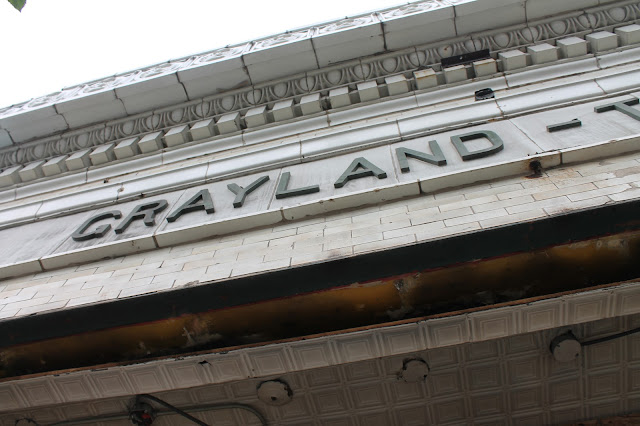The other day as I was driving to work, I passed Rasenick's as I do every day, but this time I noticed out of the corner of my eye that portions of the building were boarded up. I passed too quickly to get a good look, but initially it appeared as though a vehicle had crashed into the store. I hoped for the best and made a note to check it out on my way back after work. When I finally got out of work, I drove past the former nickelodeon and was shocked to see it - the building in a state of repair and with the sheet metal removed, revealing a Grayland Theatre epigraph!! HA!! I KNEW it...I just KNEW that sheet metal wasn't just there for nothing. The epigraph was stunning, the building seemed transformed into its former self, at least for the time being. The front window was removed and covered with plywood, with a makeshift sign assuring people that Rasenick's was still open despite the construction. I couldn't stop to look at it since I was actually heading to an appointment I couldn't miss, but I quickly grabbed the phone number and called the store to inquire as to the future of the store and the epigraph. An upper management employee (or maybe even the owner) picked up. I mentioned that I had seen the storefront and was happy to see that the sheet metal had been removed to allow the world to see the once-hidden epigraph. I then asked what was expected to come of the construction project. The employee told me the plan was to "smash up and tear the front down as soon as possible" so that a more modern facade could be put in its place. I kind of gulped and was shocked to hear this. I asked why they hadn't planned to preserve the terra cotta or at least the epigraph and got a rude, condescending response. "Look. We are a clothing store, we are the longest-running small business at Six Corners. We are not a theatre and never will be. If you are interested in Rasenick's, I can help you, otherwise, I don't have time to talk about anything else. We informed the neighborhood association, the historical society, and the Alderman, and no one wanted to do anything about it, and now it's too late". I told him that I was a customer of their store and simply wondered why they didn't care to preserve their historically significant building. He could not have been any more indifferent about the historical significance.
I do not believe that Rasenick's ever made an attempt to reach out to any organization, the community, or the Alderman to seek funding for the preservation of the facade and epigraph. Last year the owner straight-up lied to me about what was beneath the sheet metal. If he cared so much about preserving the facade enough to seek funding or assistance, he would not have lied to me last year. If it were me, I'd raise awareness of the issue early so as to raise the funds to restore and retain the facade. I would not lie to repeat customers about the history of the building and what existed beneath the sheet metal.
Look, I understand that not everything old has to be saved. I totally understand that. Sometimes I do become overly sentimental about certain things. However, the significance of the Grayland Theatre as one of the first small movie houses in Portage Park is so important to the character of the neighborhood. The Six Corners district is undergoing a long-term revitalization after a long period of closed-down storefronts and low foot traffic/parking issues. What Rasenick's should keep in mind is that some of the most successful businesses in the city still retain epigraphs of former business of importance - bath houses, fire stations, post offices, architects, and even the nearby former People's Gas & Coke building, which is a National Historic Lamdmark. Rasenick's hasn't quite caught up to this trend and believes it will better its already quite successful business by destroying its unique facade and replacing it with a boring flat wall of bricks. Or maybe they are simply big advocates of Rahm Emanuel's Beautify Chicago plan - a plan that involves modernizing everything and getting rid of "eyesores" such as neon signs. I just wish for a moment they though of the good that could come out of preserving history - what people can learn about their community beginning with its past, and how it developed into what it is today. The Portage Theater thankfully still exists in good condition, and a few other buildings of note remain (the former Borovik Drugstore, for example). If all you see is new construction replacing older buildings, what does it tell people about history? That it is insignificant and meant to be forgotten? With all due respect to Rasenick's (because I understand they are a small business and small businesses are needed), I think they planned without regard for retaining history - a tool that can teach us about our present and ultimately our future.
First, the photo I took last year.
These photos were taken today, just days after the removal of the sheet metal.
Very soon, this will all be memory. All in the name of "progress".















